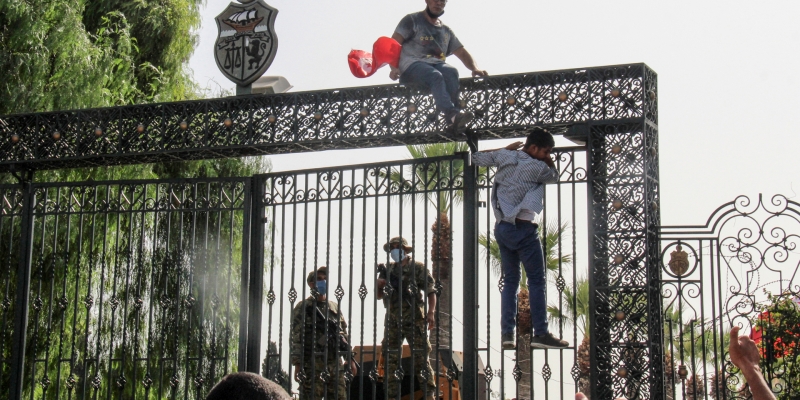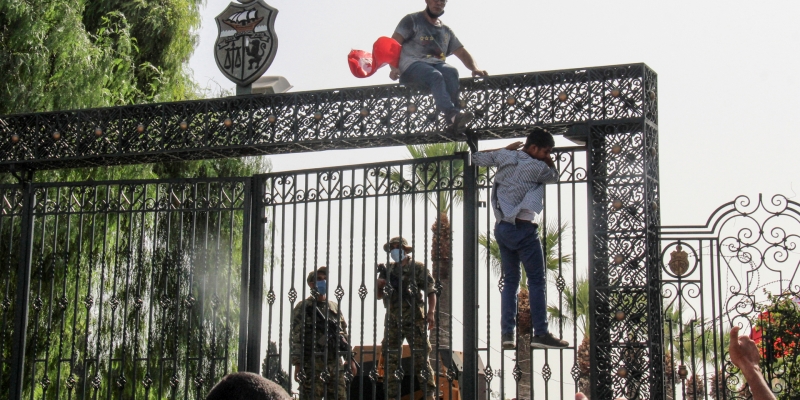ToWhen a political crisis broke out again in the first country of the “Arab Spring”, Tunisia is experiencing the most acute political crisis since the “Arab Spring”. President Qais Said suspended the work of the parliament and took executive powers into his own hands, the opposition accused him of a coup d’etat

On Monday, July 26, mass clashes took place near the Tunisian parliament building between supporters of Tunisian President Qais Said and supporters of the Islamist party “Ennahda” (“Revival”), which is headed by parliament Speaker Rashid al-Ghannouchi. The reason for the unrest was Said’s unprecedented decision to concentrate power in his hands, made the day before.
How Robocop took power
On Monday night, the head of state said in a televised address that after consulting with the Speaker of the Parliament and the Prime Minister, he decided to suspend the activities of the parliament (while al-Ghannouchi said on Monday that he did not participate in any consultations, and the head of the cabinet, Hisham Mashishi, did not comment on the situation). “The first decision I had to makea few months ago, it concerns the parliament & mdash; this decision to suspend all its activities»,— Said. He also announced the removal of immunity from deputies and his decision to head the prosecutor’s office. In addition, the president assumed full executive power in the country, dismissing Mashishi. Said promised that a new prime minister would be appointed, but this did not happen on Monday.
Said, who is a specialist in the field of constitutional law, said that all his actions are in accordance with the Tunisian Constitution adopted in 2014, which “does not provide for its [parliament’s] dissolution, but does not prevent the suspension of its activities”. Later, the presidential office clarified that the work of the parliament was frozen for 30 days. Said also said that all these measures are being taken, ” until the public peace returns to Tunisia and until we save the country.”
After the President’s televised address, the military, on his orders, surrounded the parliament building and other strategically important state facilities. 80-year-old al-Ghannouchi was not allowed to enter the parliament-he intended to challenge the decisions of the head of state together with other deputies. Ennahda has the largest faction in the parliament, itcontrols a quarter of the seats. The Qatari TV channel Al Jazeera, which actively covers the events in Tunisia, reported that the police stormed its Tunisian office on Monday. About 20 representatives of law enforcement agencies told journalists about the need to stop working, and explained their actions by a court decision.
Tunisian Robocop
Qais Said won the presidential election in October 2019, gaining just over 72% of the vote in the second round. The 63-year-old politician is a non-partisan, he conducted the election campaign without attracting budget funds and public rallies, campaigned in cafes, in the markets of the country’s cities, on social networks, TASS reported. The Financial Times calls him a populist. Al Jazeera explained his victory by the fact that the law professor was not associated with any of the political groups. During the pre-election period, Said supported the decentralization of power and electoral reform inIn particular, he proposed to introduce a multi-stage system instead of direct parliamentary elections, in which citizens elected representatives to local councils, who, in turn, — regional and national deputies. Said is known as a supporter of the law on the death penalty against terrorists and the criminal prosecution of homosexuals, he opposed the equalization of men and women in inheritance rights. For his external resemblance to the famous movie hero and the manner of speech, he received the nickname Robocop, writes The Guardian.
What caused the political crisis
What is happening now in Tunisia, The Financial Times calls the most serious political crisis since 2011, when the events of the “Arab Spring” began. In Tunisia, they led to the flight of President Zine el Abidine ben Ali, who ruled for more than 20 years, constitutional reform and the victory in parliamentary elections of the previously banned Ennahda. The Tunisian transit of power was recognized by most experts as the most successful against the background of the upheavals that have engulfed other countries in the region. In 2014, the Constitution was adopted, which distributed power between the president, the prime Minister and the chairman of the parliament.
In 2015, the Tunisian National Dialogue Quartet received the Nobel Peace Prize for the quartet’s decisive contribution to the construction of a pluralistic democracy in Tunisia following the results of the Jasmine Revolution of 2011. However, the political situation in the country was not stable. The political crisis of 2020, by agreement with the main political players, was resolved by the appointment of Mashisha as Prime Minister. However, the government did not work in full force— the president refused to approve 11 ministers, so many combined posts.
The economic development of the country was also quite slow. The World Bank, in its review of Tunisia, indicates that by the end of 2020, the strong negative impact of the coronavirus pandemic on the country’s economy became obvious-the decline was stronger than that of other countries in the region, as the country entered the crisis with retardingeconomic indicators and the growing level of public debt. As a result, GDP declined by 8.8% in 2020, and unemployment rose from 15% at the beginning of the pandemic to 17.8% by the end of the first quarter of 2021. The most serious increase in unemployment was observed among women (24.9% unemployed) and young people aged 15 to 24 years (40.8% unemployed).
The morbidity and mortality rates from coronavirus in Tunisia are also among the highest in North Africa. According to Johns Hopkins University, in a country with almost 12 million people, 569 thousand diseases and 18 thousand deaths were registered, only 7% of the population was vaccinated.
The restrictions imposed due to the pandemic caused the protests that started at the beginning of the year. The Prime Minister of Mashishi admitted that the protesters had reasons to take to the streets, but at the same time about 600 people were detained, the Washington Institute research draws attention. Public opinion polls cited by the institute show that more than 80% of Tunisians are dissatisfied with the direction of the country’s development, which was mainly due to dissatisfaction with the economic situation.
How will the confrontation end
Speaker al-Ghannouchi called the actions of President Said a “coup”, the bureau of the Parliament described his decrees as “insignificant”. Al-Ghannouchi and his party claim that the President did not hold the negotiations provided for in article 80 of the Constitution. “A number of commentators interpret the incident as a coup d’etat, since the president refers to the 80tharticle, but the application of this article assumes that the president takes up the powers in coordination with the parliament. When the Constitution of 2014 was written, special measures were taken to prevent the usurpation of power by the president, ” says Vasily Kuznetsov, an expert of the Valdai Club, head of the Center for Arab and Islamic Studies at the Institute of Oriental Studies of the Russian Academy of Sciences.
The Tunisian crisis is caused, among other things, by the constant confrontation between the president and the parliament, which did not allow the executive power to take effective measures to resolve both the sanitary crisis and the economic one, Kuznetsov says. According to his observations, the president’s decision was approved by a significant part of society, did not cause significant resistance from a number of political partiespolitical parties and public organizations. Thus, the statement of the influential General Tunisian Union of Labor was made in very restrained tones, it mainly refers to the need to preserve the foundations of the constitutional order. According to Kuznetsov, the situation is dangerous precisely because the Constitution of 2014, which was the result of a compromise between all the political forces of the country, may be called into question.
It was possible to find a way out of the crisis by applying to the Constitutional Court, the creation of which is provided for by the Constitution, writes The Washington Post, but due to political differences, the court was never created, the last attempt to establish it was blocked by President Said in January of this year.
RBC on Twitter Instant news and videos on our Twitter

